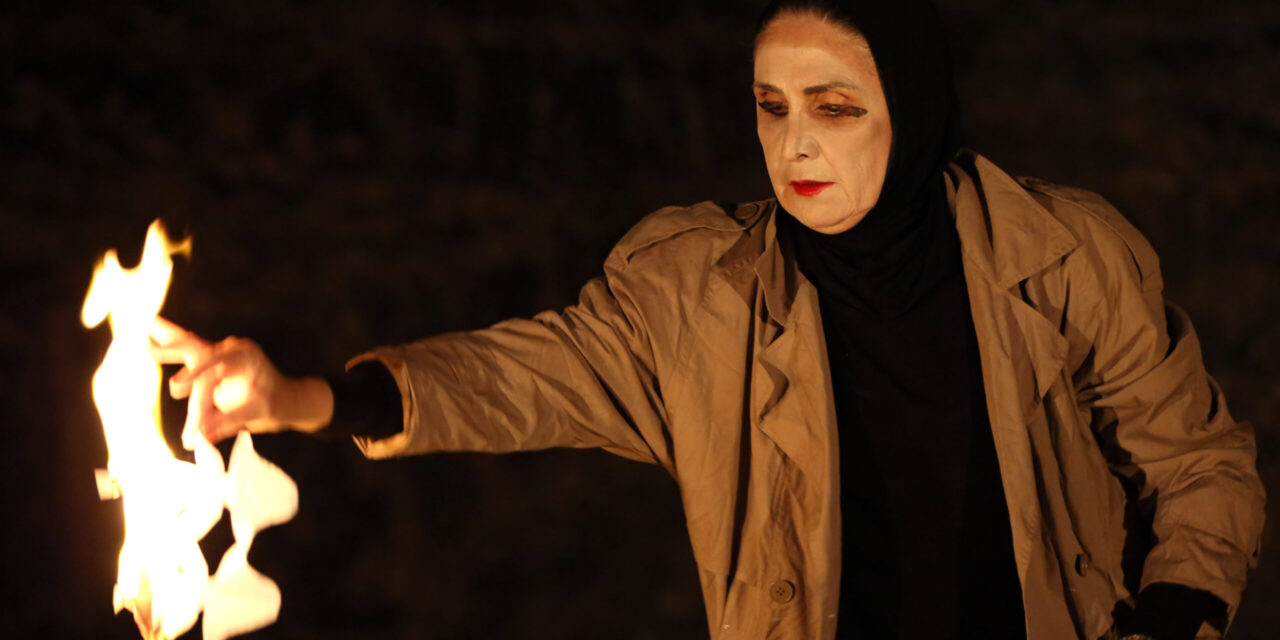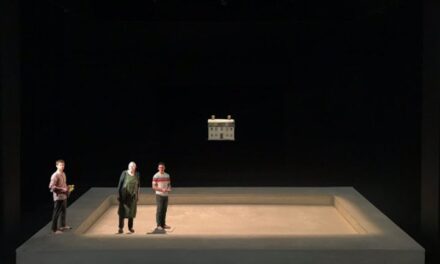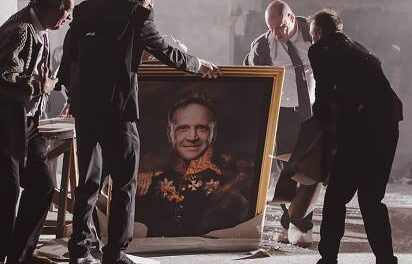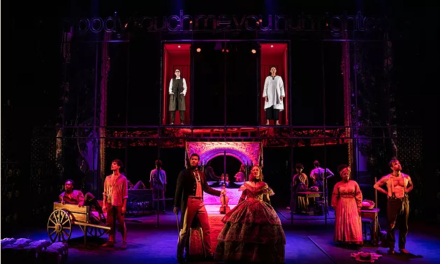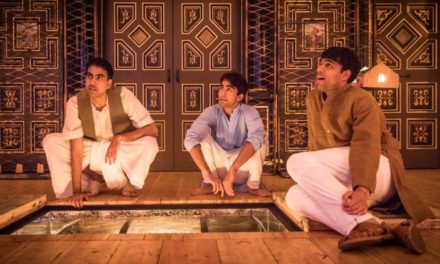The occasion of this interview is Hanane Hajj Ali was chosen to receive the 2020 Gilder/Coigney International Theatre award presented by the League of Professional Theatre Women. The award ceremony and panel discussions begin on Tuesday, February 16, 2021, 1:00 PM – 2:30 PM EST.
Heather Waters (HW): Lebanon is facing grave challenges right now: extreme poverty and hunger, Covid-19, recovering from the August 2020 explosion, a new government, and the recent currency crash. What are your preoccupations as a citizen and artist of Lebanon in the current political climate?
Hanane Hajj Ali (HH): My preoccupation number one is with freedom of expression. As usual, we wake up every day to a new disaster. I don’t know if you have heard, but yesterday the writer and activist Lokman Slim was assassinated. He is an icon representing the most courageous thinkers and writers of Lebanon. All over the world, there is an increase in diminished cultural rights–freedom of expression, freedom of mobility–all kinds of freedoms and rights. All of them are important to my theater. What happened yesterday, unfortunately, gave me another push towards this preoccupation. It is a sign about what is going to happen. Many years ago, one of the most brilliant writers and thinkers, Samir Kassir, was killed in the same way. His assassination was the beginning of a series of assassinations in Lebanon at the time. Now we are expecting another series of assassinations. So as an artist and activist, freedom of expression is my focus in the coming future.
HW: Do you have a specific project you are working on right now?
HH: Due to the financial situation, most of us are trying to survive doing many things and it can be difficult to concentrate on dealing with many problems. I have many occupations. I am a researcher, trainer, and teacher. I am active in several groups that were formed during and after the October Revolution. The main group is for cultural and artist workers. A second group I belong to gathers young people from different disciplines such as political studies, sociology, theater, and filmmaking. It is more of an alternative group than the first one. In both groups we think, we debate. When something happens, we make our manifesto and publish articles for social media. We design posters for interventions that we perform in the streets even with Covid-19.
I am happy to be in many groups. This keeps me busy. It keeps me aware and updated. It helps me think about what the alternatives for the future could be. The revolution movement was a bit slowed due to Covid-19. Covid-19 was a kind of gift to our politicians, who are happy to keep us confined at home. Despite Covid-19, yesterday, for the first time in 25 days, I applied for permission to go out. I put on 3 masks. I went to the house of Lokman Slim.
These groups help me to survive. I do not feel shut out. I do not feel that I have nothing to do. Of course, I do not have the luxury to think only about my theater. As we all know, the most important thing about theater is the live encounter between citizens, between performers and the audience, theater’s critical gaze on old taboos. Since we are not able to have this encounter right now, it does not mean that theater is dead. Theater was created 2,500 years ago. At times it flourishes while other times it disappears. It reappears in certain political and social conditions, taking new shapes. It never dies.
What is happening it that our living surroundings, the city, I say city in brackets, as some of us live in towns, the city becomes porous. The theater is no longer confined to a space. Tents flourished downtown during the revolution. Many things were happening in these tents like debates, and live performances. One of my dreams was realized to see our city become a 360-degree open theater, a space of different expressions.
Around the world, we are all living the same difficult situation. We cannot keep on saying it is not going to happen to me. Black Lives Matter and the U.S. Capitol situation have shown us that no one is safe. Artists can no longer work alone. We have to cooperate with human rights activists, educators. We need to create many different kinds of bonds that cross transnational borders in order to overcome an obscure future. When Covid-19 happened, we hoped that, for once, superpowers and politicians would start to think differently. As a matter of fact, they did not. As for our ecological systems, the situation is worsening. Putting plays online can help, but it is not theater. It helped me be able to see Palestinian plays. I have not been able to see the artistic work of Palestinians before this, who live so close and yet so far. We may not be able to return to theater as it was. The new ways we will be working will also be important.
HW: Your play Jogging has been produced in many countries. I imagine that global interest in your work brings with it more opportunities. Does it also bring with it a perception in Lebanon that you are colluding with foreign influences in ways that you are not or do not intend?
HH: I do not make theater to be a star or to make money. I don’t want to be a star. I have always been involved with alternative culture outside of the mainstream. I discovered theater in childhood during the civil war. This is when I learned of the power of theater to transform atmospheres of fear and stress into celebrations of solidarity and joy. While I was studying genetics and biology, I applied to study in the theater department. Theater allows me to practice my rights as a complete citizen. Complete citizenship in Lebanon is hindered in many ways. There is censorship. Women are subjected to different kinds of violence by patriarchal society where impunity for men is protected by laws! Women are far from having full rights in Lebanon. As an example, Women are unable to give full citizenship to their children.
Before Lebanon was created by the English and the French in 1920, Lebanon, Syria, Palestine, all these countries, were one country. Since Lebanon’s independence, the Lebanese leaders agreed on a national pact based on sectarian distribution of the high positions of the state: the President must be a Manorite Christian, the Speaker of Parliament must be a Shiite, and the Prime Minister must be a Sunni. Full citizenship is hard to be achieved in Lebanon. Theater is a place to express our collective memory, our untold stories, to reconstruct biased history, to talk about our love stories, from the people’s point of view.
It would be difficult to change public perception about me. People see me as an artist and activist who is committed to making a better society. I have been a vocal activist all of my life. I have some credibility. This does not mean one day some politician will not falsify information about me to try to change public opinion about me. This is happening in Lebanon. Two years ago, the well-known and respected actor, Ziad Itani, went through a nightmare after being accused all of a sudden to be a spy! People today are depressed to see Lebanon is degrading. To hear that someone like me gets international recognition is so far a source of joy and pride. This does mean not there is no talk about foreign agendas. There is always talk about foreign agendas. There is talk about where an artist’s loyalties lie when he or she receives international funding, especially when an artist frequently travels outside of the country. Fortunately, so far this is not the case for me.
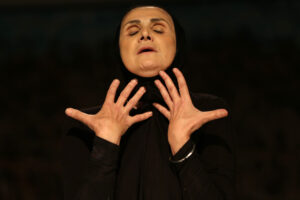
Hanane Hajj Ali in Jogging. Photo Credit: Marwan Tahtah.
HW: I thought you are very brave when I heard you openly criticize your government’s censorship visa law in an online interview. You went on to explain how this law led you to perform Jogging on the street for free.
HH: The censorship law was supposed to be a temporary law to prevent quarrels and fights among factions during the Civil War. It was supposed to end once the Civil War ended, but here we are the law continues. It is illegal for this law to continue.
It is impossible that in the 21st-century playwrights and directors must still get permission from the government to present their plays to the public. I was able to present Jogging without a censorship visa for several reasons. One is I did not apply for the visa before I took the play to the streets. Getting refused a visa and then going ahead with your play is worse than never applying.
I did not sell tickets. Selling tickets might have attracted attention from the authorities. I instead printed copies of the play in three languages. I brought these books to my performances. It turned out many audience members liked the play and bought the books. This is how I funded my play.
In my opinion, theater is not defined by the dates a play is presented to an audience. It includes the conception and development phase before its performance dates and continues on until after the last performance is over. In line with this concept, the full title of the play is Jogging: Theatre in Progress. I read that my adding “theatre in progress” led some on social media to believe that the play was not finished. This could be another reason why I avoided problems with the censorship department. I am just guessing, of course. That I escaped the censors does not mean I will not be in danger later on. I could be jailed, fined $10,000, and the places I performed could be shut down.
HW: What the U.S. Capitol siege and the Black Lives Matter movement exposed this year is the potential for civil war in the U.S. is a real concern, unless Americans find a way to reconcile differences (Blue and Red State categories oversimplify how intermingled our political factions are). Do you have advice regarding what artists can do to help heal the divide? Or is there a more meaningful conversation to have about the role of the artist in perilous political times?
HH: During the civil war, which lasted 15 years, all of Lebanon was cut into regions. Demarcation lines were drawn. Snipers were positioned along these lines to shoot at people who tried to cross them. We still have divisions, but back then you could lose your life for being on the wrong side.
Once the civil war ended, my husband, who is a director, and I, decided to put on a show together. We expressly wanted to work with actors from both sides of Lebanon. In the first days of rehearsals, everyone was looking at each other like “what the hell are we doing here together–we’ve been fighting for 15 years.” We were all deaf people not able to listen to each other.
Our theater was near the sea. It was shocking to me that some of the actors from East Beirut did not know that Beirut borders the sea before they visited us. Beirut is very very small. This just shows how profound the separation was. And yet during rehearsals, something magical happened. This was so, even though the topic of our show was taboo: the 17,000 people who were kidnapped and went forcibly missing during the war. Despite attempts made by many movements to get answers, we never found out what happened to them.
HW: There are many fascinating modern and classic Arabic plays worth seeing, that speak of the human condition, and yet Arabic plays are seldom produced in the United States. Do you see ways a more robust international cultural exchange would help heal mutual distrust of nations on the international level?
HH: It is unacceptable that Arab artists are refused visas when they are invited to prestigious international festivals. I had the chance to participate in the Edinburgh Fringe Festival. While many Arabs artists were invited to take part, I traveled alone to the festival because all my crew, and the 2/3rds of other Arab artists invited to attend, were refused visas.
I was able to go because I have a French passport. I considered not going because of this situation for the other participants. My husband urged me to go and talk about it. I went and added a prologue to my play to talk about this. I did not have a crew to put on my play. The Arab performers who could not come were obliged to show their plays via video. Some plays were canceled. Emma Thompson heard about what was happening and came to the festival. She read in front of the media some of the refusals by the embassy. She really lobbied with us. And, finally, I was able to bring my technician director for the last two days. I was really proud to get my group together.
I don’t know –they are afraid of what. They are afraid of immigrants? Do they want to stop terrorism? This is not the way to stop terrorism. If you want to stop terrorism, if you want to prevent waves of immigrants, stop selling arms. The American and the European people should not accept that their governments continue to produce and sell arms to back up terrorist factions that later would be obliged to fight. This is absurd.
We have to be in solidarity around the world so artists can get the artist visa. Diplomats have immunity, but artists do not. This shortens a lot of exchange between the North and the South. Moreover, I do not know why, but in the cooperation between countries, most of the movement is from the North to South and not vice versa. The cooperation between countries is not equal. We receive artists from abroad to join us in our festivals and workshops, but we are not invited in return, despite the fact that we have wonderful artists who deserve to be known. We have to change this mentality on all levels of society.
HW: The League of Professional Theatre Women is a membership organization. It established The Gilder/Coigney award ten years ago to acknowledge and I am reading from their website: “the exceptional work of women internationally with the goal of amplifying their voices across borders and across the globe, highlighting their work as cultural diplomats.”
Do you a have vision for how amplifying the voices of women theater artists could evolve into programs without the fear of censorship due to funder bias? You have already described the daunting challenges we face to make this happen.
HH: This is a question that has to discussed by all of us women artists that believe in the type of exchange. This is a major issue, and it cannot be a one-sided opinion. If you go through the list of women nominated for the award this year–wow. How would I know about these astonishing women if not for this award? What if we decided to create a program over three, four, or five years–not only to get to know each other in celebration of the award, but to help us go further to create collaborations that multiply this type of cooperation.
We could also come together to help women in other countries to be able to do their projects. For instance, I lately visited Sudan to do a workshop on culture policy. I was approached to return to Sudan to collaborate on a theater project. I said, yes, I would come back even though the political situation is unstable and the living conditions are very bad. Sudanese people suffered from 30 years of dictatorship and they are undertaking a wonderful revolution. If you ask me to think of programs, I have plenty of ideas. We have to have the will to do the work together.
This post was written by the author in their personal capacity.The opinions expressed in this article are the author’s own and do not reflect the view of The Theatre Times, their staff or collaborators.
This post was written by Heather Waters.
The views expressed here belong to the author and do not necessarily reflect our views and opinions.

